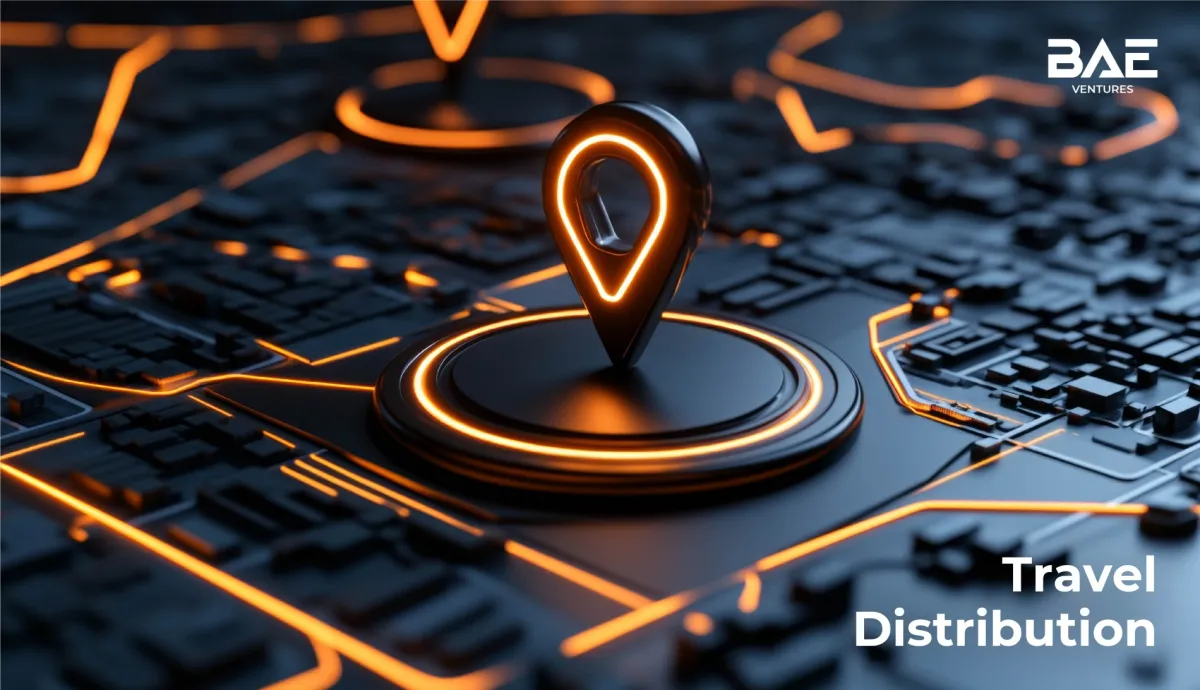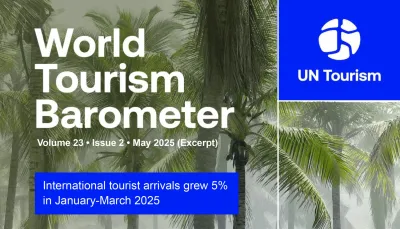Travel Industry
Customer experience
The AI Revolution in Travel Distribution

Travel Industry
Customer experience
The travel industry is undergoing a radical transformation driven by Artificial Intelligence (AI). From planning to customer experience, technology is redefining the way we travel, making processes more efficient, personalized, and secure. However, with this revolution comes a set of challenges that industry leaders must navigate strategically.
At BAE Ventures, we closely monitor these advancements and their impact on travel distribution. AI is not just a trend—it is a fundamental shift in how travel services are designed, distributed, and consumed. As part of our commitment to shaping the future of this industry, we are launching a series of 15 opinion pieces that will explore 14 critical areas where AI is redefining travel. Each article will provide an in-depth analysis of opportunities, challenges, and innovative solutions that are already shaping the sector’s future.
The 14 Themes of the Series
- Customer Experience Personalization – AI enables hyper-personalized travel recommendations based on customer preferences, past behavior, and contextual factors. This extends to tailored flight and hotel suggestions, customized itineraries, and even real-time service enhancements based on traveler interactions. However, ensuring transparency and regulatory compliance (e.g., GDPR) is crucial to maintaining consumer trust.
- Dynamic Pricing Optimization – AI-driven pricing models analyze demand patterns, competitor pricing, and external factors to adjust airfare and hotel rates in real time. This ensures optimized revenue management while offering competitive and fair pricing to consumers. However, the industry must address consumer perceptions of fairness in pricing fluctuations.
- Customer Service Automation – AI-powered chatbots and virtual assistants are revolutionizing customer support, providing instant responses to queries, booking assistance, and even proactive recommendations. Natural language processing (NLP) enables these systems to handle complex interactions more efficiently. The challenge lies in balancing automation with the need for human touch in high-value interactions.
- Demand Forecasting and Trend Prediction – Machine learning algorithms analyze historical data, booking trends, and external influences like geopolitical events or weather patterns to anticipate fluctuations in travel demand. While this helps businesses optimize inventory and marketing strategies, their effectiveness depends on data quality and adaptability to unpredictable events.
- Inventory Management Enhancement – AI enhances supply chain efficiency by predicting booking trends and dynamically adjusting seat allocations, hotel room availability, and package offerings. This ensures optimal utilization of resources while minimizing overbooking risks. The key challenge is integrating AI with legacy systems across fragmented travel ecosystems.
- Customer Segmentation and Marketing – AI-driven segmentation allows travel companies to categorize customers based on demographics, behavior, and purchasing intent. Targeted advertising, dynamic email campaigns, and predictive loyalty programs help maximize engagement and conversion rates. Yet, over-personalization risks create a sense of intrusion among travelers.
- Intelligent Search Experiences – AI-powered travel search engines leverage semantic search and voice recognition to enhance user experience. The question remains: how can businesses ensure unbiased, diverse recommendations in AI-driven search results?
- Optimized Travel Itineraries and Route Planning – AI suggests optimal routes and itineraries by considering traveler preferences, local events, real-time traffic, and weather conditions. This improves efficiency and convenience for both leisure and business travelers. The challenge is integrating this with multi-modal transportation networks to create seamless travel experiences.
- Process Automation for Agencies and OTAs – AI reduces operational costs by automating manual tasks such as ticket issuance, cancellations, and refunds, and data entry. Adoption, however, remains a hurdle for traditional agencies resistant to digital transformation.
- Fraud Detection and Cybersecurity – AI-driven fraud detection monitors transactions in real time, identifying anomalies that may indicate fraudulent activity, enhancing security. Advanced cybersecurity measures, such as biometric authentication and behavioral analytics, enhance digital safety for travelers and businesses alike.But as cyber threats evolve, the industry must continuously refine AI models to stay ahead of sophisticated fraud schemes.
- Sentiment Analysis and Customer Feedback – AI-powered sentiment analysis tools evaluate reviews, social media posts, and direct customer feedback to measure traveler satisfaction and identify areas for service improvement. While this enables companies to respond proactively to customer needs, AI-driven reputation management must be used ethically to avoid manipulation
- Facial Recognition and Biometrics – AI is streamlining airport security, hotel check-ins, and border control through facial recognition and biometric authentication. This not only enhances security but also reduces wait times and improves the overall travel experience. Yet, privacy concerns and regulatory restrictions may impact widespread adoption
- Integration with Virtual Assistants and IoT Devices – AI seamlessly connects with smart devices, allowing travelers to receive real-time updates, manage smart hotel room settings, and interact with AI-powered travel assistants like Google Assistant and Alexa. . The challenge is ensuring interoperability across diverse platforms and brands.
- Sustainability and Operational Efficiency – AI contributes to eco-friendly travel by optimizing flight paths for fuel efficiency, enabling smarter energy use in hotels, and supporting the development of sustainable tourism initiatives. This helps the industry reduce its environmental impact while improving cost efficiency. However, the increased computing power required for AI processing raises concerns about its own carbon footprint.
BAE Ventures’ Role in the Future of AI-Driven Travel
At BAE Ventures, we are actively engaging with these transformations through research, strategic investments, and partnerships with travel technology pioneers. Our investment strategy is centered on startups that leverage AI to enhance efficiency, elevate customer experiences, and drive sustainable innovation in travel.
For example, we are currently exploring collaborations with AI-driven pricing engines that balance revenue optimization with customer fairness. We are also evaluating startups focused on predictive analytics to help travel businesses anticipate demand shifts with greater accuracy. These initiatives align with our mission to shape a more intelligent and responsive travel ecosystem.
As we navigate this AI-driven era, our focus remains on helping industry players integrate these technologies responsibly. The key to success is not just automation but the strategic application of AI to create real, sustainable value for both businesses and travelers.
Join the Conversation
This series is just the beginning of an in-depth exploration of AI’s role in travel distribution. We invite you to engage with us as we analyze each of these critical themes, offering insights into how companies can leverage AI effectively.
Follow our upcoming articles for a deep dive into these trends, and connect with us to discuss how AI can drive competitive advantage in your travel business. The future of travel is being written today—let’s shape it together.



